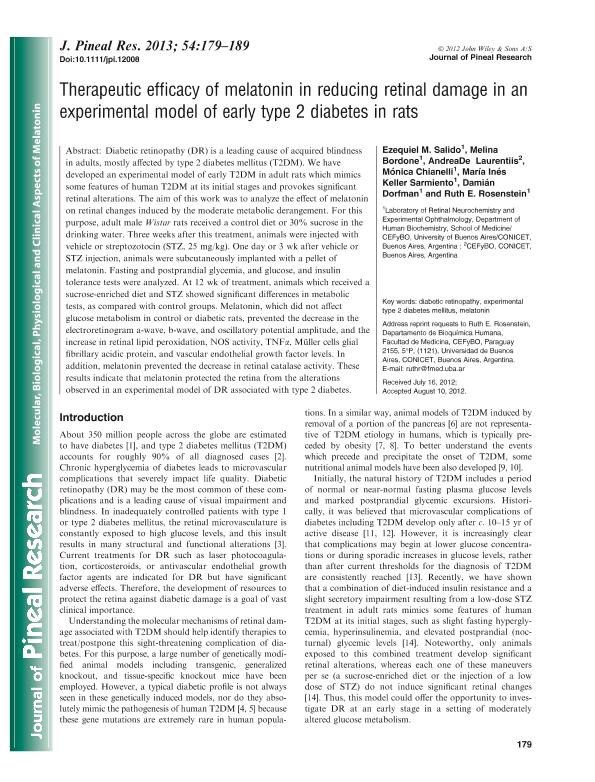Artículo
Therapeutic efficacy of melatonin in reducing retinal damage in an experimental model of early type 2 diabetes in rats
Salido, Ezequiel Martin ; Bordone, Melina Paula
; Bordone, Melina Paula ; de Laurentiis, Andrea
; de Laurentiis, Andrea ; Chianelli, Monica Silvia
; Chianelli, Monica Silvia ; Keller Sarmiento, Maria Ines
; Keller Sarmiento, Maria Ines ; Dorfman, Damián
; Dorfman, Damián ; Rosenstein, Ruth Estela
; Rosenstein, Ruth Estela
 ; Bordone, Melina Paula
; Bordone, Melina Paula ; de Laurentiis, Andrea
; de Laurentiis, Andrea ; Chianelli, Monica Silvia
; Chianelli, Monica Silvia ; Keller Sarmiento, Maria Ines
; Keller Sarmiento, Maria Ines ; Dorfman, Damián
; Dorfman, Damián ; Rosenstein, Ruth Estela
; Rosenstein, Ruth Estela
Fecha de publicación:
03/2013
Editorial:
Wiley
Revista:
Journal Of Pineal Research
ISSN:
0742-3098
e-ISSN:
1600-079X
Idioma:
Inglés
Tipo de recurso:
Artículo publicado
Clasificación temática:
Resumen
Diabetic retinopathy (DR) is a leading cause of acquired blindness in adults, mostly affected by type 2 diabetes mellitus (T2DM). We have developed an experimental model of early T2DM in adult rats which mimics some features of human T2DM at its initial stages and provokes significant retinal alterations. The aim of this work was to analyze the effect of melatonin on retinal changes induced by the moderate metabolic derangement. For this purpose, adult male Wistar rats received a control diet or 30% sucrose in the drinking water. Three weeks after this treatment, animals were injected with vehicle or streptozotocin (STZ, 25 mg/kg). One day or 3 wk after vehicle or STZ injection, animals were subcutaneously implanted with a pellet of melatonin. Fasting and postprandial glycemia, and glucose, and insulin tolerance tests were analyzed. At 12 wk of treatment, animals which received a sucrose-enriched diet and STZ showed significant differences in metabolic tests, as compared with control groups. Melatonin, which did not affect glucose metabolism in control or diabetic rats, prevented the decrease in the electroretinogram a-wave, b-wave, and oscillatory potential amplitude, and the increase in retinal lipid peroxidation, NOS activity, TNFα, Müller cells glial fibrillary acidic protein, and vascular endothelial growth factor levels. In addition, melatonin prevented the decrease in retinal catalase activity. These results indicate that melatonin protected the retina from the alterations observed in an experimental model of DR associated with type 2 diabetes.
Palabras clave:
Diabetes
,
Melatonin
,
Rats
Archivos asociados
Licencia
Identificadores
Colecciones
Articulos(CEFYBO)
Articulos de CENTRO DE ESTUDIOS FARMACOLOGICOS Y BOTANICOS
Articulos de CENTRO DE ESTUDIOS FARMACOLOGICOS Y BOTANICOS
Citación
Salido, Ezequiel Martin; Bordone, Melina Paula; de Laurentiis, Andrea; Chianelli, Monica Silvia; Keller Sarmiento, Maria Ines; et al.; Therapeutic efficacy of melatonin in reducing retinal damage in an experimental model of early type 2 diabetes in rats; Wiley; Journal Of Pineal Research; 54; 2; 3-2013; 179-189
Compartir
Altmétricas



